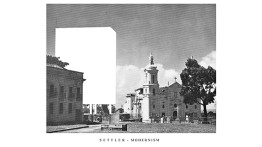Student Lecture Series | Paulo Tavares: Settler-Modernism
Thursday, October 21, 2021, 6:30 - 8:30pm

This presentation will be conducted in person and through Zoom. Zoom account registration is required, please register in advance here.
In this talk Paulo Tavares explores recent projects such as Des-Habitat, Memory of the Earth, and the curatorship of the 2019 Chicago Architecture Biennial to unravel the complicities between modernism and colonialism in architecture and its medias. Appropriating and subverting means and languages, these projects turn spatial practices in design, writing and curating into arenas of asserting rights and advocacy.
The lecture will be followed by a public discussion moderated by Augustine Crane.
Paulo Tavares is an architect, writer, and educator. His work has been featured in various exhibitions and publications worldwide, including Harvard Design Magazine, the Istanbul Design Biennale, and the São Paulo Art Biennial. He is the author of the books Forest Law (2014), Des-Habitat (2019), and Memória da terra (2020), and was cocurator of the 2019 Chicago Architecture Biennial. He currently teaches spatial and visual cultures at the University of Brasília in Brazil and leads the architectural agency autonoma.
This event is free and accessible to the public through Zoom.
View the full Fall 2021 Lectures and Events List.




